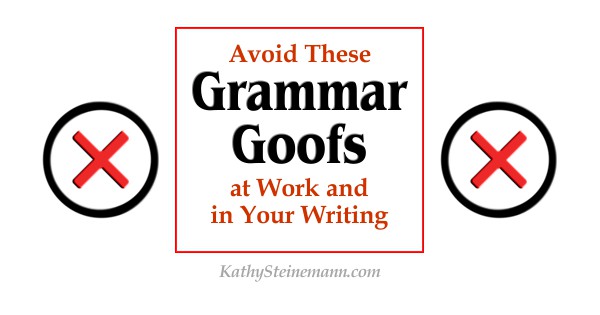
Grammar Goofs: #1 in a Two-Part Series
This post by Jim Bessey is the first in a two-part series about grammar goofs that might irritate people in your office or alienate savvy readers. Expressions like this might suit the dialogue of some characters, but knowledgeable narrators will avoid them.
Jim discusses five common gaffes. The second article will cover five more.
—
“Nip it in the butt”
One of your trusted team members approaches you with a small problem that has the potential for disaster. You’re glad she brought it to your attention, and you tell her, “Wow, we’d better nip that one in the butt!”
She smiles back, a little quizzically, and agrees. “I’ll get right on it,” she assures you. Later, she repeats your reply to a coworker, and they both have a good laugh about it.
Why?
Because the actual expression is “Nip it in the bud.”
This is a metaphor that references the way a spring frost can kill flower buds, and dates back to the early 1600s. As much as we might enjoy the image of a determined dog snagging a retreating derriere, you’ll sound more intelligent by using the horticultural version of this expression.
“A tough road to hoe”
The road to hell may well be paved with good intentions, but you probably won’t find any hoe-wielding demons there. This is a perfectly common case of two words that sound similar — and both seem to fit the metaphor.
The correct expression for a difficult task you face ahead is “That’s going to be a tough [or hard] row to hoe.”
If you’ve ever tended a sizable garden plot in rocky soil, you know all about hoeing hard rows. Those pesky weeds never give up easily. Hot sun on your head only adds to the misery.
No one in modern times has ever had to hoe a road, even a dirt road. We’ve had better methods for at least 2000 years.
Fortunately, your coworkers are unlikely to call you out if you make this small language error. On the other hand, now you know better!
“I really need to go lay down”
You’ve probably said this before. (Haven’t we all, at one time or another?) You might not have realized that you have laid a grammatical egg. Next time fatigue overwhelms you, I want you to lie. Lie down, that is.
How can you remember this annoying grammar rule? You could consult any number of fancy conjugation charts and try to memorize the correct forms of these two simple verbs.
Or, you can remember these two sample sentences:
Hens lay eggs.
Men lie down.
The expression that tends to confuse us all is “Now I lay me down to sleep.” The key here is that the verb lay takes an object — eggs, or me, for instance. Lie needs no object, though it does love a position — down, or in bed, for instance.
If you want to impress a grammar nerd, try this one: “I cannot lie. I must now go lie down with lions.” Or not.
The Writer’s Lexicon series
and additional resources on my Facebook page.
Let’s discuss less and fewer.
You’re at a company function and observe, “Wow, there are a lot less people here this year than last year.” This isn’t an unusual statement, but it is technically incorrect. Less is a comparative adjective for aggregates — things you generally can’t count. When you can count individual things, you should instead use fewer. One of the reasons this is confusing is that there is no such distinction for the word more.
Less means a smaller quantity. [not countable]
Fewer means a smaller number. [countable]
More means more stuff or things, either way.
Examples make this more clear:
I wish we had less pollution in the air.
I wish there were fewer pigeons in the park.
Many people will spend less money on gas this year.
There are suddenly fewer coins in circulation.
You can see how quickly this small difference can become confusing. In this example, money is an aggregate noun composed of cash, coins, checks, and credit cards. Coins, on the other hand, are countable objects — even if the number is very large or difficult to establish.
Unfortunately, some people simply couldn’t care less about the difference between fewer and less. But now you know.
“We need to hone in on that one.”
Sounds fine, doesn’t it? You have a particular problem or task that needs your full attention, so everyone needs to hone in on it. Okay, so everybody grab a knife and a whetstone …
This little ear-fooler is for the birds, literally. Pigeons, to be specific. Homing pigeons know how to home in on their home coop. Despite all obstacles, they are able to focus on their destination and home in. And the same metaphor applies to your problem-solving situation: you need to home in on a solution. All’s well when you arrive home.
So, where does honing come into this question?
Turns out, you hone things at work, too. Most commonly, you hone your skills by becoming better — sharper — at doing things.
Correct examples:
We need to home in on a new slogan for the Quiggley account. Let’s brainstorm!
If you want to produce videos, you’ll need to hone your editing skills. Practice!
Next time, we can talk about what happened when those pigeons flew the coop! Time for me to go home now.
© Jim Bessey
—

Jim Bessey offers copyediting and proofreading for novelists. He loves writing about fiction, and enjoys creating puns about knights. Join the daily discussion at Facebook.com/SoWriteEditing/.
The Writer’s Lexicon series
and additional resources on my Facebook page.
Discover more from KathySteinemann.com: Free Resources for Writers
Subscribe to get the latest posts sent to your email.

This was both fun and informative. I’m good with today’s lesson, except of course – the old lay and lie, but ‘hens lay eggs’ I will remember. Thanks! 🙂
Heh heh. I cannot lie, I like to lie down and have a nap once in a while, but I’ve never tried to lay eggs. 🙂
Thanks for reading, DG. Glad you enjoyed this. I still have to judge my brain with “hens lay eggs,” too. And still have to double-check for laid and lain as needed. I’m glad we don’t have too many more like those!
Hi Mr. Jim and Miss Kathy. Thanks for the helpful info.
I’m still confused about “fewer” and “less.” Is this more or less correct?
There once was a hen named Celeste,
who lay fewer eggs than the rest.
There once was a hen named Celeste,
Since she ate much less food
than the whole chicken brood,
she’d lie down and sleep in her nest.
My sister says, “Hens lay and men just plain lie.” Ack! Lol.
Since most of the the poem is in simple past tense, Celeste laid fewer eggs would be correct.
The hen lays eggs.
The hen is laying eggs.
The hen laid eggs.
Less and fewer look good. 🙂
Thanks for visiting — nice to hear from you again, Lenny. Stay safe!
I love your grammar poem, Lenny!
If I could manage to memorize that, it would be a powerful mnemonic.
I believe less and fewer are two of the most misused pairs, even in advertising. Hearing words used incorrectly by professionals in the media can only increase our confusion. Have a wonderful week, and thanks for reading!
You hit a few of my pet peeves in this one. Thanks for the post.
Thanks for stopping by, Rosi.
Stay safe!
Kathy will have a new batch for you next week, Ross.
It’s funny how easily our ear for language can be fooled, isn’t it?
I can’t tell you how many times I’ve had to change “tenant” to “tenet.” Or “principle” to “principal” (and vice versa).
Excellent examples, Nicole! Thanks.
I’m with you, Nicole!
How about capital and capitol?
I used to hear “rough row to hoe.”
That’s fine, too!
It does have an alliterative ring to it. Thanks, Ed.
Thank you! It’s so easy to slip up. I edit and edit again to check myself. It’s amazing how even good writers err…”I would of thought” is popular… Ouch. Another goof which annoys me. “Your not going to believe this..” I feel like shouting out WRONG! Awareness is the key, and knowing the rules.
You’re so write about that!
Those errors are slipping into everything we hear and read. Sad. Thanks for stopping by again, Joy!